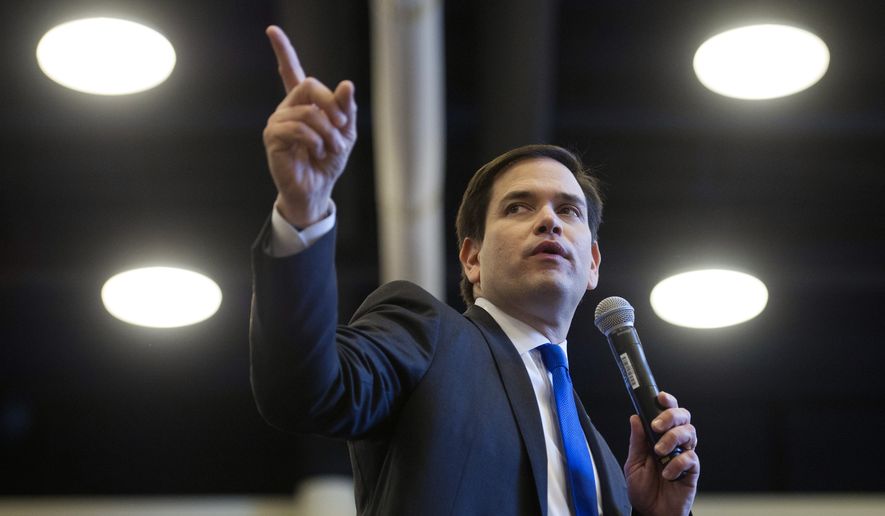Sen. Marco Rubio was so over the Senate that he missed more than half of the chamber’s votes in late 2015 and repeatedly mocked his colleagues for being useless.
Now, the Florida Republican is giving serious thought to revoking his retirement and running to rejoin his fellow senators for another term.
The erstwhile presidential candidate is being intensely courted by party leaders in Washington, who hope he will be able to keep the seat for Republicans more easily than other party candidates.
But running would require several about-faces for Mr. Rubio, including eating his words about the frustration of serving in the Senate. He also would be the anointed candidate of the Republican establishment — a far cry from the tea party darling he was in his 2010 race, when he chased a sitting governor, Charlie Crist, from the Republican Party.
That makes his decision about whether to run less than certain.
“Rubio has been around long enough where his opponents will paint him as an insider,” said Nathan Gonzales of The Rothenberg & Gonzales Political Report, a nonpartisan group that tracks elections. “I don’t think there are any guarantees if he runs for the Senate and quite a risk if he does it.”
SEE ALSO: Carlos Beruff: Marco Rubio should pass on 2020 White House run if he seeks re-election
Mr. Rubio is racing a Friday filing deadline, but he has begun to clear the field for the Republican primary. Rep. David W. Jolly announced Friday that he was ending his Senate bid in order to defend his House seat, and he said he expects Mr. Rubio will run again.
Lt. Gov. Carlos Lopez Cantera, Rep. Ron DeSantis, businessman Carlos Beruff and Todd Wilcox, a former CIA operative, also are running in the Republican primary.
But Mr. Cantera has urged his ally to run again and said he will bow out if Mr. Rubio does so. Mr. DeSantis said he would reconsider running with Mr. Rubio in the race.
The Beruff campaign, though, said the businessman “is staying in this race no matter what.” That means Mr. Rubio would have to win a heated primary and then a general election to keep his seat.
Beruff spokesman Chris Hartline said voters are looking to send a message this year and Mr. Rubio isn’t the messenger they want.
“They’re sick of career politicians and power brokers in Washington who care about one thing: holding on to power. But the voters of Florida will not obey them. They don’t get to pick our candidates,” Mr. Hartline said.
Mr. Rubio’s single term in the Senate began with a meteoric rise, and conservatives saw in him a future president. But many of those conservatives grew angry when he tried to pass a bill legalizing most illegal immigrants.
The immigration bill and an uneven presidential campaign doomed Mr. Rubio’s White House bid. He notched an embarrassing loss in the Florida primary in March, badly trailing Donald Trump in his lifelong home state.
Still, Mr. Rubio maintains strong name identification in Florida and has the proven fundraising skills to compete in an expensive campaign state that Democrats view as key to flipping control of the Senate.
On the Democratic side, two-term Rep. Patrick Murphy is favored against Rep. Alan Grayson, a liberal firebrand, in the primary.
Kyle Kondik of the University of Virginia’s Center for Politics said Mr. Rubio would have his work cut out for him in the primary and general election if he runs.
“Rubio’s star has dimmed after his presidential race, and he could potentially face problems in both a primary and a general election,” Mr. Kondik said in his latest breakdown of the race.
Indeed, Mr. Rubio has been bloodied by the presidential nomination race and polls in Florida show his approval rating underwater.
The stakes are high for the senator, who is thought to be considering another White House run in 2020. Another loss in his home state could sink him politically.
For months, Mr. Rubio dismissed calls to file for re-election before the June 24 deadline, mocking reporters and pundits for suggesting otherwise.
“I have only said like 10,000 times I will be a private citizen in January,” he said last month, and reiterated his support for Mr. Cantera.
He changed his tune last week after Mr. Cantera urged him to reconsider defending his seat in the wake of the mass shooting at a gay nightclub in Orlando.
“People get up there and they just think that somehow they couldn’t survive without them or the district or state could not find a better person to serve,” said Aubrey Jewett, a political science professor at the University of Central Florida. “In this case, it seems that he is maybe heading down that path, but I can’t totally blame him since many people in the party — including in the national party — are urging him to run.
“It may get him thinking, ’I might be being selfish if I don’t run,’” Mr. Jewett said.
• Seth McLaughlin can be reached at smclaughlin@washingtontimes.com.




Please read our comment policy before commenting.